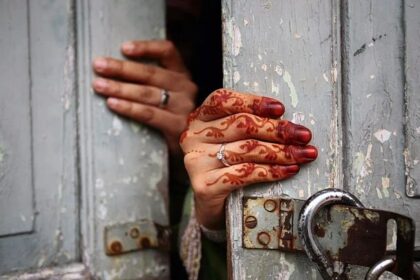We raised monsters, then called them martyrs.
Hands are joined in prayer when a foetus is placed in the womb; soft, reverent pleas of it being a boy are sent upwards. They hold their breath—not for health, but for the satisfaction of a boy being born—a vessel to carry their name forward.
Yet sometimes this vessel does more than carry the legacy onwards. It learns that having a name is more powerful than any conscience.
His first steps are applauded just like any other kid, but he is fed a different diet—main courses lathered with arrogance, dessert served in cups of ignorance. Notes of forgiveness are tucked deep into his pocket, where even he forgets they’ve been kept. He learns early on that his volume is his weapon; for the louder he screams, the faster people come to help.
When he yanks a toy from another’s hand, they excuse it with revised lines of “Oh! He didn’t mean it!” He shoves, he bites, and he leaves his teeth indents behind, marking up his territory. What begins as a bite levels up to unmeasured amounts of slammed doors, and still they say, “He’s just a boy.”
Our boys aren’t raised on talks of being soft or gently navigating through life; they are told to eviscerate anything or anyone that stops them from getting what they desire, so in this case, a “no” is overlooked if it messes up their original game plan. Consent becomes negotiable. Rejection is a wound to their masculinity. They are instructed that anger is worthy above all; everyone succumbs to a louder man—that this dominance is the only thing worth praising.
A child mirrors what he sees, a systemic rotation of presiding characters. According to one theory of hegemonic masculinity presented by sociologist R.W. Connell, it loosely dictates that our society rewards assertive boys. That may not necessarily be a bad thing, but when coupled with slightly more significant traits, it consequently turns catastrophic, for the boy who is emotionally detached and dominant will be looked upon in the hierarchy, while the softer character might be frowned upon in terms of him being weaker and generally submissive, though that is not always the case.
A door is slammed harsh enough for its rattle to echo through the halls, a hand is brought up to silence the father, and sweet honeyed murmurs of “he’s just tired” are whispered by the mother. She raises him in pride, but somewhere along the line, these mothers bend to the whims of their sons, cushioning them from consequence.
She speaks on his behalf, protecting him behind her maternal shield. “He did not mean it like that,” she tells the girl. “He’s under pressure.” In desi houses, due to television dramas, every mother is expected to scold the son, straightening him into a patient gentleman acting as their first teacher, but instead of them playing their parts, they rip off their skins, donning more meek ones.
When a line is crossed, it quickly becomes redrawn—hand-scribbled to fit his regime.
So, when homes learn the art of forgiveness, the patriarchy welcomes its newest members, blooming through family dinners where the girl serves and the son sits. Each member plays their part in instilling this value through teachings of overlooking rage—mothers and daughters silencing themselves when the father is in a “mood.” It’s the grandmother who praises her grandson louder while taunting her granddaughter to sit like a lady.
We raise boys with badges of being protectors, helping them memorise entitlement as their second language, so when the line blurs and someone bleeds, we ask the girl why she was there, what she had worn, or if she had uttered a single word.
So when he breaks something unfixable—a girl’s trust, the family’s legacy—we bring out the regretful hymns of “He was such a good boy” and “He had such a bright future.” The same hands that had clapped for him now stood on the sidelines as they witnessed his downfall.
Somewhere along these lines, we fail our boys, forgetting that they, too, were born in the same systems that narrated to their fathers how men who cried were pathetic and told their grandfathers that a man without command is no man at all. Patriarchy reduces their lives to revolve around dominance.
We don’t just fail our systems; we fail our boys. Habitus is not instruction—it’s inheritance, as coined by the sociologist Pierre Bourdieu, who relates how our boys never opted for dominance over softness but have simply learnt it from watching the way their fathers spoke, their sisters were silenced, and their mothers were scolded. So, before the boy can even spell patriarchy, he becomes fluent in it.
But what if we raised a different son?
One who was taught fury could never be worn as armour, and one who is taught that gentleness never dimmed honour and that volume does not validate the truth. The essence of a true man lies in how he treats others.
What if we called him out on the first bruise, speaking to him so softly it was almost considered sacred? If we let his tears fall instead of drowning out his noise.
The world does not need more martyrs. It needs whole men, not those sculpted into weapons, but those who know how being good isn’t an option but rather a universal obligation. For we need to make them realise that this world owes them more than armour; it owes them tenderness laced in unprecedented levels of accountability.
Why can’t we create a manhood that rises by lifting them, not by how loud you speak or how many you destroy to reach your desires? Let us raise a different kind of son—one who remembers that power without being gentle is really no power at all. Let us build them up into men for whom we won’t have to pray silently, nor apologise on their behalf, or carve graves for the people they never learnt to love right.
















